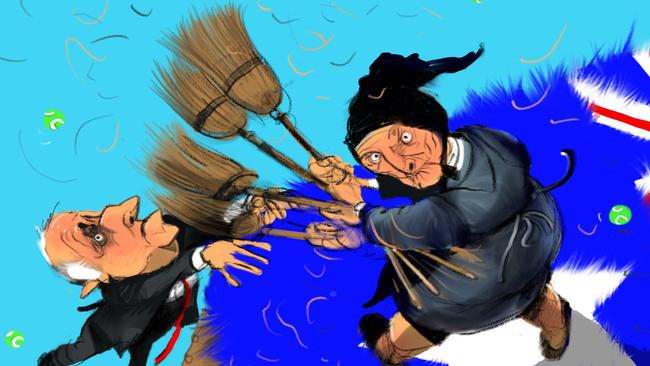Leader on life support shows fatal lack of nous

For a Prime Minister on life support, the rolling citizenship crisis is like the power cutting in and out on the ventilator; it hasn’t yet killed him but the chances of recovery are fading by the minute.
How it got this bad is a potent example of Malcolm Turnbull’s lack of political nous. He might have been a successful businessman but politics is a profession, and judgment, along with temperament, are mandatory requirements.
Unfortunately for Turnbull, you can’t buy judgment, so he’s left lurching from one poorly managed issue to the next, rather than taking charge of problems that will determine the fate of his one-seat majority and keep him ahead of the game.
When the case of Scott Ludlam and Larissa Waters first came to light, as the parties in government with all the resources that entails, the Coalition should have gone down the burrow and interrogated the nomination paperwork of every member and senator. Relevant to any potential breach of section 44 is the date and place of birth of the parliamentarian, their parents and their grandparents. If any of these births involved a foreign country, or a later acquired foreign citizenship, then expert advice should have been sought. In circumstances where the advice did not clear them, the MP should have been referred to the High Court, along with the cases of Barnaby Joyce, Fiona Nash and others. One single referral, and by-elections if needed, rather than death by a thousand cuts. To think the government could refer some and not others in the hope that the truth would not out, that the media would grow bored or the public would be sympathetic to our most senior politicians breaching the Constitution, was naive in the extreme.
In politics, the reckoning always comes and it’s far better to be in charge of events than hostage to them. As well, even in times of trouble, demonstrating leadership can actually be rewarded by a community that’s desperate to see politicians take responsibility for issues of their own making; John Howard’s management of the travel rorts affair that threatened to engulf his first-term government is a case in point.
The rules regarding dual citizenship are well known. There are also prompts on the nomination form signed by every candidate at each federal election.
If you can remember the Howard travel scandal then you’ll also remember the case of Jackie Kelly who won the seat of Lindsay in Howard’s 1996 landslide only to fall foul of s. 44 and win the seat back again at a by-election later the same year. This is the sort of example that’s seared into the mind of every political aspirant and every senior staff member, or at least it should be.
None of this is as hard as Turnbull might want to make out, with his claims last week that it would costs millions to do an audit (when has that stopped governments?) and would require extensive genealogical inquiry (so much is now online). Not true; most claims for citizenship by descent are extinguished at parent level and only in a limited number of cases does it relate to grandparents.
The idea that MPs can’t discover the birthplace of parents and grandparents should be enough to disqualify them from sitting in the parliament due to lack of IQ more than anything else.
For the avoidance of doubt, even where a citizenship entitlement has been extinguished, a letter could be lodged with the relevant diplomatic mission that makes clear that if the country in question ever changed the law to re-confer any citizenship right (the Hungary example), it was to be automatically rejected.
Let’s not forget Sykes v Cleary doesn’t require absolutes, just “all reasonable steps”.
Turnbull’s announcement on Monday to require a disclosure of sorts via the established register of members’ (and senators’) interests process is a half-pregnant solution to a problem that’s sucking the oxygen out of his struggling government.
It won’t fix the constitutional problem that has now beset the 45th parliament because the register itself has no teeth and only the High Court, sitting as the Court of Disputed Returns, can determine the fate of MPs.
The registrar, in both the house and the Senate, merely receives entitlement-related disclosures and does not have the authority — or the role — to check the veracity of what is provided.
Under the current process, it is actually the media and staff on both sides of the chamber who test the declarations lodged by MPs against what is on the public record, expenditure-tabling reports or via company searches.
Only when discrepancies come to light, and the hue and cry is sufficient, is action taken. Referrals to the privileges committee are rare and the sanction, while on paper strong, is in reality weak. The recent example of former Labor MP Craig Thomson proves this point.
I know case after case of MPs who needed to be chased, cajoled and in some cases threatened to get their paperwork in order and lodged with the registrar. Some of it was oversight, but for others they honestly felt compliance was intrusive. Unless found out, they got away with it, too.
Under current rules, and Turnbull’s new citizenship plan, there is no automatic referral to the High Court of questionable cases even if someone were to check them. Turnbull will shortly leave this mess behind and head overseas leaving Julie Bishop as acting PM; here’s that lack of judgment again.




